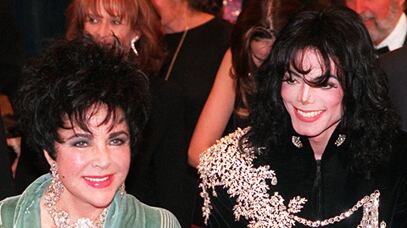Questions continue to swirl about how Michael Jackson apparently died from a prescription-drug overdose. After discussing Jackson’s medical history with several people personally familiar with it, The Daily Beast has uncovered new details about his early pill dependencies, including the role of an influential friend: Elizabeth Taylor.
Jackson idolized Taylor, multiple sources confirmed, holding her up as if she were the actual title character from Cleopatra, which he had watched dozens of times, bringing his friends regularly to meet her. Jackson told one she was “a mythical figure.”
And it was Taylor who endorsed Arnold Klein, the cosmetic dermatologist to Hollywood’s A-list, to Jackson. One of Klein’s nurses, Debbie Rowe, later married Jackson and was the surrogate mother for his first two children. One tabloid report even suggested since the pop star’s death that Klein was the biological father of those children, something he dismissed outright.
ADVERTISEMENT
Jackson was twice warned by a good friend that his relationship with Taylor was toxic because she unwittingly fed his addiction.
In the mid-'80s, when Jackson was a new patient at Dr. Klein’s office, Taylor was seeking help for her own prescription-drug and alcohol problem. According to a source intimately familiar with Taylor’s medical history in the 1980s, she sought help from at least two doctors to counter her growing drug dependence. After multiple visits to one of them, she abandoned the pretense of wanting to be drug-free and instead asked for Dilaudid and Ativan, the first a powerful opiate that street users dub “the Bentley of heroin,” and the latter a tranquilizer.
The doctor refused and demanded she come clean on her entire prescription history. He then discovered that Taylor was using more prescriptions than she had disclosed during her earlier visits. A source close to the doctor said that when she was pressed about who was prescribing such a wide mix of drugs, she said it was Dr. Klein. The doctor urged her to enter rehab—she did in 1988—and much later remarked to an associate, “I’m surprised she’s still alive.”
A person familiar with Jackson’s medical history says this was around the time Jackson first began using some of the same pain and sleeping pills as Taylor. Dr. Klein was treating Jackson for vitiligo (which causes depigmentation and patchiness in the skin), this person says, and Jackson often complained about residual pain from his 1984 accident in which his hair caught on fire while filming a Pepsi ad.
Dr. Klein not only counted Taylor and Jackson as patients but socialized with both. When Liz celebrated her birthday, for instance in 1999 at Las Vegas’ Bellagio Hotel, at an Andrea Bocelli concert, she only invited Michael, Klein, her hairdresser, and her then-boyfriend, a Beverly Hills dentist and his two sons.
“Michael was often visiting Liz,” Michael LaPerruque, head of Jackson’s security for different periods this decade, told me. “And at different times, I met Dr. Klein. He would also be around.”
In January 1993, Michael Jackson performed at the 20th-annual American Music Awards at Los Angeles’ Shrine Auditorium. Liz Taylor gave him a special award, and Jackson and Taylor were walking together after the show. “She was teetering, and you could smell the alcohol on her,” recalls a witness. “Her eyes were glazed.”
Jackson was twice warned by a good friend that his relationship with Taylor was toxic because she unwittingly fed his addiction—she would never encourage him to straighten out as she had the same problem. In each instance, the normally nonconfrontational Jackson abruptly cut off any discussion. “He would hear none of it,” says the friend.
This shared relationship—Jackson, Taylor and Klein—continued all the way to the days before Jackson’s death. I spoke to Ben Evenstad, the 29-year-old founder of The National Photo Group, which had Michael Jackson as its primary subject for the past few years whenever he was in Los Angeles. Evenstad assigned a photographer to Jackson six to seven days a week since he returned to Los Angeles, from Las Vegas, in September 2008.
Two to three times a week, the photographers trailed Jackson to the Beverly Hills building where Dr. Klein has his office. He’d stay there anywhere from 30 minutes to five hours. The only other person the pop star regularly visited, says Evenstad, was Elizabeth Taylor. He saw her four to five times a week, usually spending hours there, until the pace slowed up when his rehearsals started in February.
Three days before Michael Jackson died, Elizabeth Taylor, who has a Twitter account as “ Dame Elizabeth” (an honorary title bestowed on her by Britain’s Queen Elizabeth in 1999), Tweeted the following: “I will never be able to thank my dear friend, Dr. Arnold Klein enough for the stunning drawing by Matisse.”
A Los Angeles Police spokesman refused to confirm or deny whether Dr. Klein was one of the five physicians reportedly the subject of their Jackson investigation. Neither Dr. Klein nor his attorney would comment. When asked about the shared dependencies of Elizabeth Taylor and Michael Jackson, Taylor’s spokesman, Dick Guttman, said, “I have no knowledge of any of that.”
Gerald Posner is the award-winning author of 10 investigative nonfiction bestsellers, ranging from political assassinations, to Nazi war criminals, to 9/11, to terrorism ( www.posner.com). Posner lives in Miami Beach with his wife, the author Trisha Posner.






